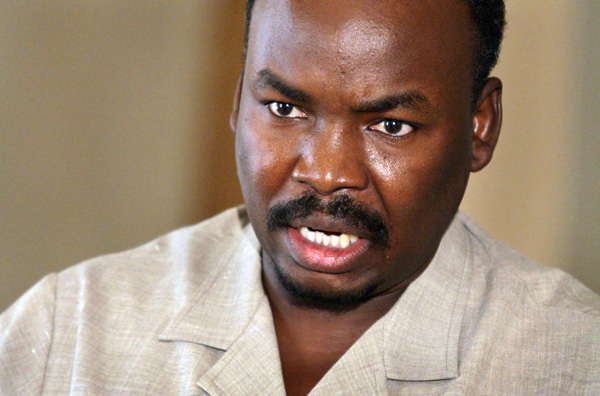
With 42 counts of war crimes and crimes against humanity already alleged to his name, South Kordofan governor Ahmed Haroun was recently captured on camera inciting Sudan Armed Forces, or SAF, soldiers to commit war crimes in the ongoing hostilities with the rebel Sudanese People’s Liberation Army-North, or SPLA-North. Footage obtained by Al Jazeera English features Governor Haroun delivering a pep talk to soldiers of the Sudan Armed Forces before pursuing the rebels in territory held by the SPLA-North.
“You must hand over the place clean. Swept, rubbed, crushed. Don’t bring them back alive. We have no space for them," Haroun said, eliciting cheers and nods from the soldiers and commanders encircling him. Haroun then advised he wants “no administrative costs” from the operations, according to Al Jazeera. Here’s the full report from the Nuba Mountains:
A spokesman for the Sudanese government responded to the video and Al Jazeera’s report by saying that Haroun’s remarks were “not interpreted correctly” and that the governor was “not ordering the soldiers to kill civilians but to kill rebels.” But even this attempt to rationalize Haroun’s comments does not absolve the South Kordofan governor of the allegation that he could be inciting war crimes. Further, the spokesman’s statement is revealing of the Khartoum government’s alarming approach to “counter-insurgency.”
Even if Haroun’s provocative remarks were clearly a reference to the approach he expects the soldiers to take against rebels alone, and not civilians—the clip featured in the above report does not make such a distinction—the killing of prisoners of war or combatants who lay down their weapon is a war crime. The Geneva Conventions provides clear protections for combatants involved in domestic armed conflict who willfully stop fighting or are forced to due to injury, sickness, or capture (Article 3). Specifically, the convention prohibits “violence to life or person,” such as murder, torture, mutilation, and cruel treatment. Haroun’s remarks, as well as an army commander’s direction to “Don’t bring them back, eat them alive," provides a clear expectation of how soldiers will treat any rebels they might capture or injure.
Further, as the official statement on how rebels should be treated, the government spokesman’s attempted justification is ominous. Senior information ministry advisor Rabi Abdel Atti‘s statements are intended head off a mounting controversy, and yet he underscores the concern raised by Haroun’s candid remarks. "What do you want us to do if rebels come and invade the area and threaten civilians and disturb peace and security in the area?” said Atti. “I think that what is said by the governor is absolutely correct to confront those.”
For rebel leaders, Haroun’s taped remarks were additional evidence of the government’s approach. “This is nothing new. This is what SAF and Haroun been already doing,” SPLA-North commander Malik Agar told the Enough Project. “This will affect civilians in the area, who will suffer the most from Haroun's ruthless strategies," he said.
In light of the Sudanese government’s indiscriminate strafing of areas held by the SPLA-North in South Kordofan and neighboring Blue Nile state over more than half a year, it would be difficult to imagine that Sudanese soldiers would be encouraged to take a more measured approach in their ground operations.
Take action now: Send a message to your member of Congress asking them to cosponsor the Sudan Peace, Security, and Accountability Act of 2012. It’s a strong piece of legislation that needs your support to get passed — one that will help in dealing with protection of civilians, emergency aid, and punishment for perpetrators of mass violence like Ahmed Haroun. Gaining a large number of co-sponsors on this legislation sends a message to the Obama administration that it needs to prioritize the crisis in Sudan and help prevent countless more deaths that would result from famine and war. Tell your friends and family to call their representatives too so we can build momentum as we take our message to the president.
Photo: South Kordofan Governor Ahmed Haroun (AP)

